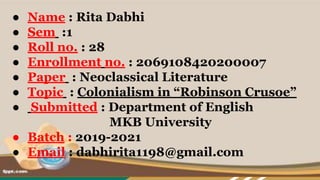Neoclassical literature sem 1
- 1. ŌŚÅ Name : Rita Dabhi ŌŚÅ Sem :1 ŌŚÅ Roll no. : 28 ŌŚÅ Enrollment no. : 2069108420200007 ŌŚÅ Paper : Neoclassical Literature ŌŚÅ Topic : Colonialism in ŌĆ£Robinson CrusoeŌĆØ ŌŚÅ Submitted : Department of English MKB University ŌŚÅ Batch : 2019-2021 ŌŚÅ Email : dabhirita1198@gmail.com
- 2. About Author : Daniel Defoe ŌŚÅ Born : 1660 ŌŚÅ Died : 24th April 1731 ŌŚÅ He was an English trader , writer , journalist , pamphleteer and spy . ŌŚÅ he was also a pioneer of business journalism . ŌŚÅ His notable works are : ŌŚŗ ŌĆ£ Robinson Crusoe ŌĆ£ ŌŚŗ ŌĆ£ Moll Flanders ŌĆ£ ŌŚŗ ŌĆ£ Colonel Jake ŌĆ£ ŌŚŗ ŌĆ£ Hymn to the pillory ŌĆ£
- 3. Ōłå What is colonialism :- ŌĆ£ colonialism is a policy of nation seeking to extend or retain its authority over other people or territories , generally with the aim of economic dominance ŌĆÖŌĆÖ. Ōłå Dictionary meaning :- ŌĆ£ The policy or practice of a wealthy or powerful Nation's maintaining or extending its control over other countries , specially in establishing settlement or exploring resources ŌĆØ .
- 4. Ōłå Colonialism in Robinson Crusoe :- ŌŚÅ Robinson Crusoe has become the prototype ŌĆ£ colonial novel ŌĆÖŌĆÖ . ŌŚÅ And has helped postcolonial critics thrive on its many nuances and themes including colonial domination racialised relations , power and the hegemony and geographical conquest .
- 5. ŌŚÅ Colonialism originated in a fantasy of power and control . ŌŚÅ The European worked at making the dream / fantasy real . Daniel Defoe shows two interesting features in the Robinson Crusoe :
- 7. Ōłå Imagination , Power and Dominance : ŌŚÅ This is the colonial theme where the wightman established his rule and dominance over the native land and people . ŌŚÅ The colonial theme is a made explicit in a series of thoughts Crusoe has : ŌĆ£ My island was now peopled , and I thought very rich in subjects and it was a me a merry reflection which I frequently made ŌĆ”ŌĆ”. ŌĆÖŌĆÖ ŌŚÅ Here Crusoe imagens himself Governor , ruler , authority and sole power .
- 8. ŌŚÅ Thus Crusoe who imagines himself as a ruler than proceeds to materially and actuality , dominate Friday and Island itself . ŌŚÅ It is also significant that Crusoe names the man he meets . ŌĆ£ I made him now his name should be Friday , which was the day I saved his life : I called him so for the memory of the time ; I likewise taught him to say master , and then let him know that to be my nameŌĆØ.
- 9. ŌŚÅ He called him ŌĆśFridayŌĆÖ which may or may not be the Man's ŌĆśrealŌĆÖ name . Naming the place one discovered was a convention of all colonial exploration . ŌŚÅ Naming gave European colonial travel a certain privilege and power over the object name . ŌŚÅ Crusoe also casts himself in the roll of ruler through the language , power and politics . ŌŚÅ Naming thus become an act of possession and power which establish the relation between the ŌĆśdiscoverŌĆÖ (Crusoe) and the ŌĆśdiscoveredŌĆÖ (Friday).
- 10. ŌŚÅ Colonialism is also seen in how Crusoe treats Friday once they leave the Island . Crusoe answer to prayer , one who he looked to like a son , he ŌĆ£civilize" so that he can become a part of the great land of England , but not as a brother of friend only as a servant . ŌĆ£ ŌĆ”ŌĆ”..my man Friday accompanying me very honestly in all these ramblings , and proving a most faithful servant upon all accessionsŌĆØ.











